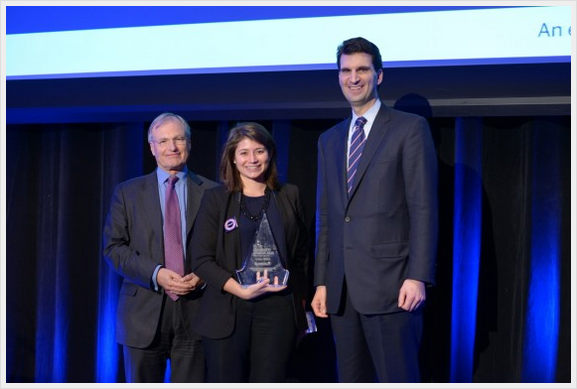
Photo: 2013-Sanergy
Sanitation project wins FT/Citi award
11 December 2013
by Richard Forster
A small toilet enterprise operating in the slums of Nairobi, Kenya, was named today as the global winner of the FT/Citi Ingenuity Awards which recognise innovative urban ideas.
The Nairobi based non-profit organisation, Sanergy, was selected by a distinguished panel of judges for developing a sustainable and hygienic sanitation system which recycles human waste to generate electricity and provide fertiliser. Sanergy provides prefabricated toilets in informal settlements and local residents purchase and operate the facilities as franchise partners, charging a levy for people to use the clean and hygienic toilets.
Waste is safely collected into sealed 30-litre airtight containers and transported every day to a central processing facility. Sanergy converts the waste into reusable by-products, including organic fertiliser which is sold to farms and electricity which is sold to the grid. The system creates employment as well as providing sustainable sanitation services.
“Sanergy represents a tremendous opportunity to tackle a massive challenge that cities around the world face and has the opportunity to be a transformative idea that can be applied throughout the world,” said David Auerbach, CEO at Sanergy. “By 2030, 2 billion people will be living in urban slums and we need to be able to find ways to deliver basic hygienic sanitation.”
The award to Sanergy is important because approximately 40 percent of African’s population has no organised system of sanitation, relying on unhygienic facilities.
“As a young start-up this award brings publicity to us and so we will be able to recruit better people and more people to join our teams,” Auerbach told CitiesToday.
The judges considered submissions from 44 countries and selected the winners based on the most innovative urban progress covering the fields of city administration, transport systems, energy and utilities, education and resource management, housing, health, social services, mobile technologies, community engagement and collaboration platforms. Four regional winners were chosen by the judges.
For Asia-Pacific, the Parinaam Foundation in Bangalore was recognised for its Urban Ultra Poor Programme, which seeks to economically and socially empower women living in the city’s slums. The programme covers four critical components delivered over a period of 12 months to enable participants to establish a more stable lifestyle — Livelihood Development, Healthcare Support, Childcare and Education, and Financial Literacy and Social Services Support.
The London-based charity, 3Space, won the European award for its work with landlords and leaseholders to unlock the value of empty commercial properties making them available for a limited period to other non-profit organisations free of charge for start-up projects benefiting the community. It has so far managed the short-term use of property in 45 buildings across the UK since 2010, giving space to 140 charities, community groups and social enterprises. Landlords benefit from reduced insurance, maintenance, business rates and security costs and can take their properties back at short notice.
The Latin American winner was the Fundación Calicanto, a non-profit organisation dedicated to restoring the historic buildings of Panama City’s old town, the Casco Antiguo. The programme seeks to help women living in poverty get training for entry-level jobs in the hotel and tourism industry, as well as entrepreneurial skills training for self-employment. Launched in 2006, it trains 120 women per year, with over 80 percent of graduates securing permanent employment, even in businesses outside the Casco Antiguo.
A website called, SeeClickFix, launched in New Haven, Connecticut four years ago and now used in more than 130 cities across the United States won the North American and Caribbean award. Combined with a smartphone application, or app, it enables people to address everyday problems in their neighbourhood by publicly documenting and sending them to their local government.
“In the face of rapid global urbanisation, the winners’ ingenuity and leadership is critical,” said Financial Times spokesman Ed Skyler. “They are true progress makers with whom we share a commitment to help cities thrive and grow.”











